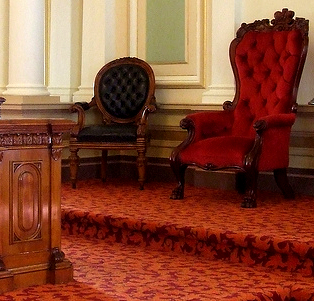Hundreds rise against impending amalgamation
 Around 600 people packed Sydney's Martin Place to protest against a NSW Government plan to merge councils.
Around 600 people packed Sydney's Martin Place to protest against a NSW Government plan to merge councils.
The Government has laid out $1 billion in incentives to encourage councils to join together, but only a couple have taken up the offer.
The low level of interest raises the likelihood of forced amalgamations.
The NSW Government says its push for mergers is backed by the Independent Pricing and Regulatory Tribunal (IPART) recent report.
IPART’s survey found a significant majority of councils did not meet “fit for the future” conditions.
Radio host Alan Jones addressed the crowd in Sydney.
“I'm glad it's a hot day because there is plenty of heat on the other side of the road,” he said, referring to the NSW Parliament House nearby.
Mr Bond accused Local Government Minister Paul Toole of lying, saying Mr Toole was opposed to forced amalgamations until his party won government.
“I don't think the people of NSW take kindly to politicians who tell conspicuous lies.”
NSW Local Government Association president Keith Rhoades said the NSW Government’s arguments supporting mergers were “a load of BS”.
“It's been proven, the simple fact is when you do your books for a company on a year, you actually add up your surpluses then you take away your deficits,” he said.
“In this case the Government added up the deficits and forgot to take away the surpluses – that's how they got their figure.”
“So much for Treasury.”
Councillor Rhoades fired shots at NSW Premier Mike Baird’s repeated claims that amalgamations would reduce rates.
“Since forced amalgamations in Queensland, rates on average have increased by 27.4 per cent. That is fact not fiction,” Cr Rhoades said.
Meanwhile. the Urana Shire – the smallest in the state with just 1,200 ratepayers – has agreed to merge with its southern neighbour, the Corowa Shire.
The council wanted to remain independent, but was told last week that would not be possible.
So, the Mayor says, Urana is moving with the inevitable changes in order to ensure its residents get the best deal.
“We are the smallest in the state and I think probably, hopefully an advantage out of that will be more capacity in a larger entity into the future, but having said that, we've functioned very well,” Mayor Pat Bourke told reporters.
“We passed and ticked all the boxes for fitness, it was scale and capacity which relates back to population in the end that failed us.”
“You try and not get too emotional and think clear for the future, but you can't help it when we've had nearly 115 years of local government history, that's been operating with a surplus.
“We've had a great model, really good area and our ratepayers, the support we've had has been absolutely tremendous, with a great mob of councillors that’ve been working as a team.
“Personally, my family history in local government's been 85 years continuous.
“It does affect you and it was a bit hollow after the meeting, but I'm sure we'll all move on make the most of what's in front of us.
“[But] if you don't merge, administrators come in and reshape your new council.
“We want to shape the new council for our ratepayers' advantage and the ratepayers in the whole new shire entity of course, that was part of our decision.”








 Print
Print